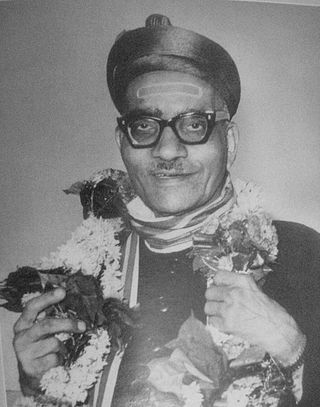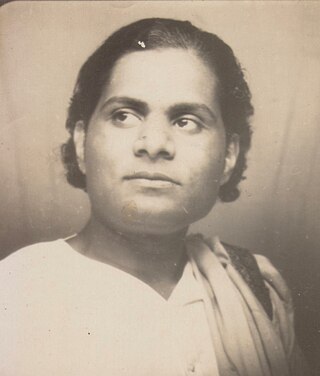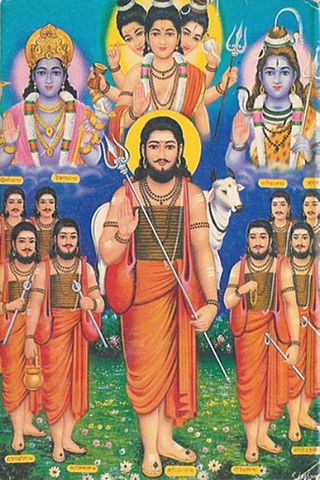
Bal Gangadhar Tilak, endeared as Lokmanya, was an Indian nationalist, teacher, and an independence activist. He was one third of the Lal Bal Pal triumvirate. Tilak was the first leader of the Indian independence movement. The British colonial authorities called him "The father of the Indian unrest". He was also conferred with the title of "Lokmanya", which means "accepted by the people as their leader". Mahatma Gandhi called him "The Maker of Modern India".

The High Court of Bombay is the high court of the states of Maharashtra and Goa in India, and the union territory of Dadra and Nagar Haveli and Daman and Diu. It is seated primarily at Mumbai, and is one of the oldest high courts in India. The High Court has circuit benches at Nagpur and Aurangabad in Maharashtra and Panaji, the capital of Goa.

Shankarrao Bhavrao Chavan was an Indian politician who served twice as Chief Minister of Maharashtra from 1975 until 1977 and from 13 March 1986 until 26 June 1988. He was Finance Minister of India from 1988 to 1989 and served as Home Minister of India in the P. V. Narasimha Rao cabinet from 21 June 1991 to 16 May 1996. He served as Home Minister of India in the Rajiv Gandhi cabinet 31 December 1984 to 12 March 1986.

Amravati district is a district of Maharashtra state in central India. It is the administrative headquarter of Amravati division, which is one of the two divisions in Vidarbha, out of total 6 regions in state of Maharashtra.
Pardhi is a Hindu tribe in India. The tribe is found mostly in Maharashtra and parts of Madhya Pradesh however small numbers can be found in Gujarat and Andhra Pradesh. The word Pardhi is derived from the Marathi word ‘Paradh’ which means hunting and Sanskrit word ‘papardhi’ which means hunting or the game to be hunted. In some parts of India Pardhis are known as Meywarees. They also have various other names like Advichincher, Phans Pardhi, Phanse Pardhi, Langoli Pardhi, Bahelia, Bahellia, Chita Pardhi, Shikari, Takankar, Takia Pardhi. Pardhi tribe is divided in groups like Vaghri Pardhi and Phase Pardhi. These are further divided into subgroups like Pal Pardhi, Gav Pardhi, Takankar, Takari. Widely found surnames among them include Chauhan (Chavan), Rathod and Solanke.
Vithal Mahadeo Tarkunde, was a prominent Indian lawyer, civil rights activist, and humanist leader and has been referred to as the "Father of the Civil Liberties movement" in India and a former judge of the Bombay High Court The Supreme Court of India also praised him as "undoubtedly the most distinguished judge of the post-Chagla 1957 period" in the Bombay High Court.

Sayed Haider Raza was an Indian painter who lived and worked in France from 1950 until his death, while maintaining strong ties with India. He was born in Kakkaiya, Central Provinces, British India, which is now present-day Madhya Pradesh.

Shri Swami Samarth also known as Swami of Akkalkot was an Indian spiritual master of the Dattatreya Tradition. He is a widely known spiritual figure in various Indian states including Maharashtra and Karnataka. He lived during the nineteenth century.

Dattatray Vaman Potdar, better known as Datto Vaman Potdar, was an Indian historian, writer, and orator. He was the Vice-Chancellor of University of Pune during 1961 - 1964.
Chandrashekhar Shankar Dharmadhikari was an Indian judge, independence activist, lawyer, author. He was acting chief justice of Bombay High Court. He was awarded Padma Bhushan in 2003. He authored many books in the Hindi, Marathi and Gujarati languages. He died on 3 January 2019 in Nagpur at the age of 91 years.

Shri Samarth Muppin Kaadsiddheswar Maharaj was a guru in the Navnath tradition of Hindu philosophy. He was a disciple of Shri Samarth Siddharameshwar Maharaj, disciple of Shri Samarth Bhausaheb Maharaj, disciple of Shri Gurulingajangam Maharaj, disciple of the 22nd Shri Samarth Muppin Kaadsiddheswar Maharaj.

Sukumar Bose was an Indian artist based in Delhi who was trained in the tradition of the Bengal School under Asit Kumar Haldar.

Mumbiram is a painter and author from India known for his leadership of the Rasa Renaissance art movement. He is best known for his renderings, in charcoal and color media, of the folk people of India in real-life situations. As a contemporary classical painter, Mumbiram introduced an indigenous art movement and created the Manifesto of Personalism. His concept of personalism in art has proliferated into the Rasa Renaissance movement that is based on the classical rasa theory of Sanskrit literature. It is a theory of aesthetics that puts the quality of human emotions that a work of art or literature arouses as the criterion of its excellence. Mumbiram is also known for his prema vivarta work of euphorisms, Deluges of Ecstasy, composed during his 12 years in the United States.

The Inchagiri Sampradaya, also known as Nimbargi Sampradaya, is a lineage of Hindu Navnath and Lingayat teachers from Maharashtra which was started by Bhausaheb Maharaj. It is inspired by Sant Mat teachers as Namdev, Raidas and Kabir. The Inchagiri Sampradaya has become well known throughout the western world due to the popularity of Nisargadatta Maharaj.

Pandit Ramdas Palsule is an internationally-acclaimed Tabla virtuoso from Pune, India. He is also an A grade artist of All India Radio and Doordarshan.
Krishn Kanhai, born on 21 August 1961, is an Indian artist and painter, specialist in portrait, realistic, contemporary paintings and on lord Radha-Krishna theme paintings. A Padmshri awardee, Kanhai is described as an artist with the midas touch.
Biren De (1926–2011) was an Indian painter of modern art, known for his paintings with tantric influences. His paintings were characterized by symmetrical patterns of geometry and the presence of tantric symbols such as mandala, phallus and vagina, reportedly representing masculine and feminine energies of the universe. The Government of India awarded him the fourth highest civilian honour of the Padma Shri in 1992.
Ramdas Shantaram Kamat was an Indian musician. He worked in Sangeet Natak, Marathi theatre.
Shankar Hari Godbole (1885–1972) was an artist who excelled in watercolour medium, portraits, landscapes and scenes of rural India. As the secretary of the Pune branch of the Bombay Art Society he organised the annual ‘Monsoon Art Exhibitions’ in Pune. His art was collected by English civil servants and army officers of colonial British India. He is the maternal grandfather of Artist Mumbiram.
Girish Y. Prabhune is an Indian social worker and social activist known particularly for his work towards upliftment of the nomadic Pardhi community and their children since 1970. He was conferred the Padma Shri in 2021 in Social Work category.













